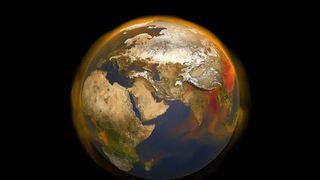Earth is hotter than ever — So what happens next?
"These are really big numbers for the Earth."
This week, NASA revealed that 2020 tied with 2016 as the hottest year on record.
The announcement, part of an annual release of global temperature data by NASA and NOAA (the U.S. National Oceanic and Atmospheric Administration), revealed that our planet just keeps getting hotter. This data is an important part of our growing understanding of climate change.
But what do these new findings mean for the future of our planet and life on Earth?
"We're already seeing impacts," Gavin Schmidt, a climate scientist and director of NASA’s Goddard Institute for Space Studies in New York City, told Space.com in an exclusive interview. Schmidt, who led the new study, named increasing numbers of heatwaves, increasing wildfires across the globe, drought, sea level changes in the Arctic, changes in rainfall and melting ice sheets in Greenland as just a few of the many consequences of climate change that we're already seeing.
Related: 2020 ties record for the hottest year ever, NASA analysis shows

"We've warmed more than 2degrees Fahrenheit since the late 19th century, those trends are continuing and may even be accelerating," Schmidt added. "And that's driven by our emissions of carbon dioxide and methane and other greenhouse gases."
Now, when talking about rising temperatures many look to the Paris Agreement, an international treaty made within the United Nations Framework Convention on Climate Change that was signed in 2016. The agreement's goal is to limit global warming to, hopefully, 1.5 degrees Celsius (2.7 degrees Fahrenheit) when compared to levels before the industrial revolution.
Get the Space.com Newsletter
Breaking space news, the latest updates on rocket launches, skywatching events and more!
"Nothing particularly terrible happens exactly at 1.5 degrees," Schmidt said. However, "what we're going to see is [a] continuing amount of damages and impacts increasing as the global mean temperature increases."
And according to Schmidt, we're not that far off from missing the goal of the Paris Agreement. In fact, "we will probably get our first year above 1.5 [degrees C] by the end of this decade, by 2030 or so. And then, to be kind of like permanently above that number, that will take maybe another 10 years," he said.
This number might seem meaningless or not all that important, 1.5 degrees doesn't seem like that much of a change without context.
But, as Schmidt pointed out, 1.5 degrees is a major deal.
"For folks who say, 'Oh, well, you know, these aren't big numbers,' these are really big numbers for the Earth," he said. "When you put it on the scale of previous changes on the Earth, this is massive."
"A really good way of conceptualizing it," Schmidt added, "is to remember that the last ice age … was only about 5degrees Celsius, [or] 8 and 9 degrees Fahrenheit, colder than the pre-industrial [levels]. And so the two degrees Fahrenheit that we've warmed since the 19th century, that's like a quarter of an ice age, right, but in the other direction.
"The fact that we're already seeing impacts, tells us that, if it gets much worse, the impacts are going to be very, very severe."
Email Chelsea Gohd at cgohd@space.com or follow her on Twitter @chelsea_gohd. Follow us on Twitter @Spacedotcom and on Facebook.
Join our Space Forums to keep talking space on the latest missions, night sky and more! And if you have a news tip, correction or comment, let us know at: community@space.com.

Chelsea “Foxanne” Gohd joined Space.com in 2018 and is now a Senior Writer, writing about everything from climate change to planetary science and human spaceflight in both articles and on-camera in videos. With a degree in Public Health and biological sciences, Chelsea has written and worked for institutions including the American Museum of Natural History, Scientific American, Discover Magazine Blog, Astronomy Magazine and Live Science. When not writing, editing or filming something space-y, Chelsea "Foxanne" Gohd is writing music and performing as Foxanne, even launching a song to space in 2021 with Inspiration4. You can follow her on Twitter @chelsea_gohd and @foxannemusic.
Most Popular

